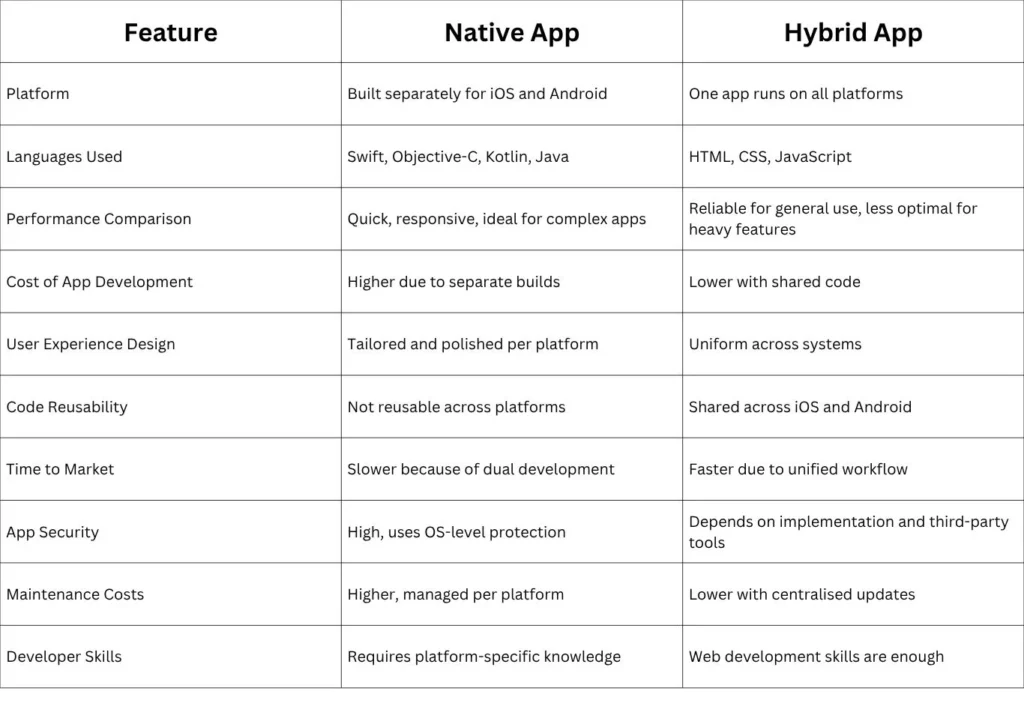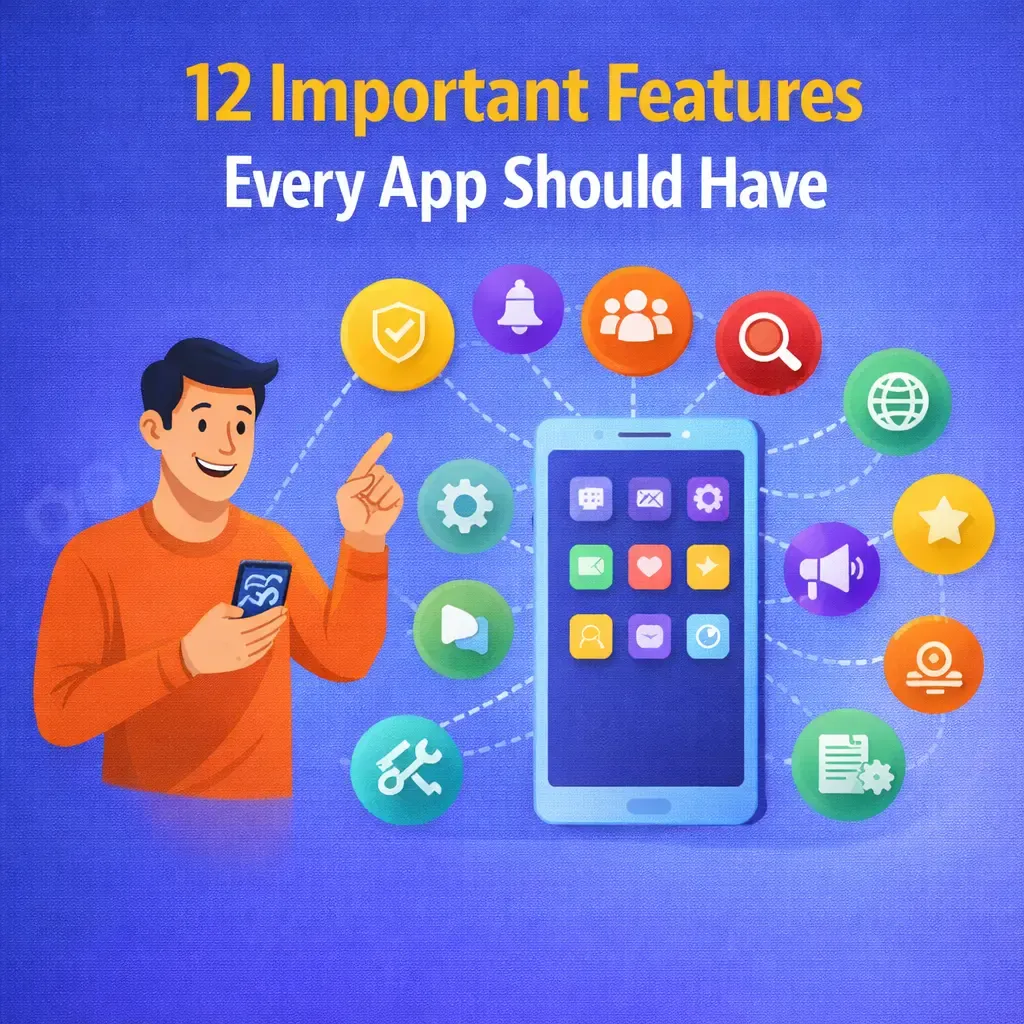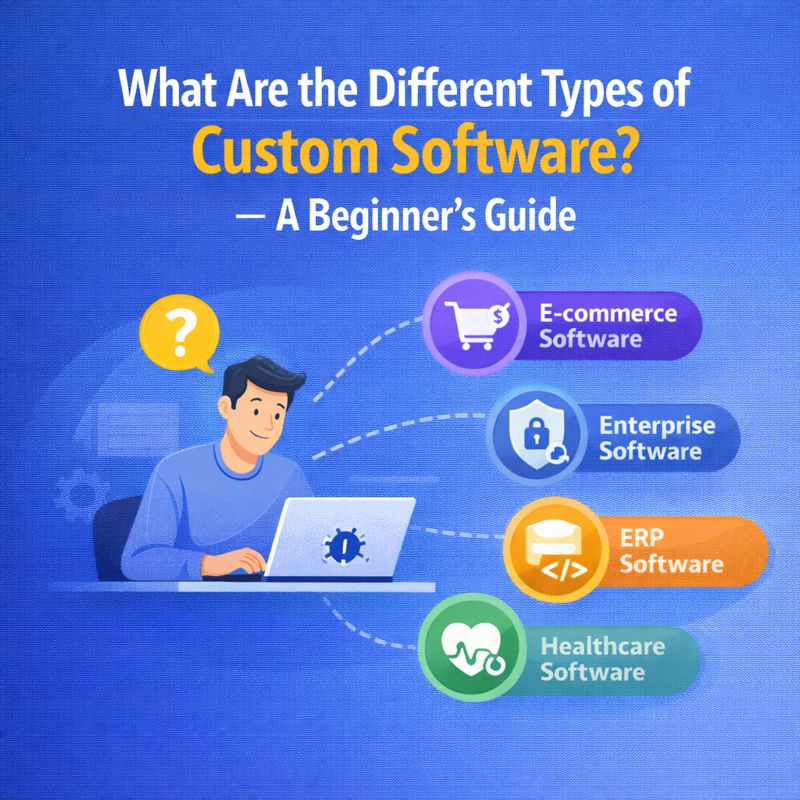The use of mobile applications plays an integrated part into the daily running of businesses by the year 2025. When it comes to reaching out to customers, providing them with the services, or operating, mobile applications are key to remaining competitive on the digital market.
A key part of mobile app development is deciding between a native vs hybrid apps. This is not just a technical choice, it affects how your app performs, how quickly it reaches users, and how much it costs to build and maintain. This blog takes a closer look at both options, helping you shape a smarter business app strategy for your company’s app development 2025 plans.
Understanding Native Apps: Tailored Power
Native app development focuses on building apps for a single operating system, either iOS or Android, using tools and languages suited for that platform like Swift, Kotlin, Java, Xcode, and Android Studio.
Key Features & Advantages:
- Native apps deliver smooth performance since they are designed for a specific platform.
- The user experience and interface are clean, responsive, and aligned with platform standards.
- These apps can access every part of the device’s hardware, camera, GPS, microphone, and more without limitations.
- Users can use core features even when offline, it is helpful to solid offline functionality.
- Security is generally strong, as these apps make full use of the system’s built-in safety features.
- App stores often process native apps faster when they follow the platform’s design rules.
Disadvantages:
- You will need to build and manage two separate versions for iOS and Android, which increases cost.
- Launching takes more time, as development and testing must be done separately for each platform.
- Code written for one system does not carry over to the other.
- Developers must know platform-specific languages and tools, making hiring more complex.
- Regular maintenance is required to stay compatible with software updates.
- Getting app store approval can sometimes be unpredictable.
Examples: WhatsApp, Spotify, Google Maps, Instagram, Uber, Sound Cloud.
Understanding Hybrid Apps: Versatility and Efficiency
Hybrid app development uses web technologies such as HTML, CSS, and JavaScript, combining them with a native wrapper. These apps run across platforms with a single codebase, using tools like Flutter, React Native, and Ionic.
Key Features & Advantages:
- One version of the app works on different platforms, saving time and money.
- The cost-effective app development model means fewer resources are needed.
- You can launch faster, especially when you are working on a deadline or testing an idea.
- Maintenance is simpler since there is only one version of the app to update.
- Certain functions can work offline by storing data temporarily.
- Web developers can easily transition to building hybrid apps without needing to learn new languages.
- Updates can be rolled out without depending on app store approvals in some cases.
- Portable code allows scaling across platforms with minimal effort.
Disadvantages:
- Performance can lag slightly compared to native apps, particularly when advanced features are needed.
- The design might feel generic since it is not built specifically for each platform.
- Security can depend on external tools or plugins, which may introduce risks.
- Apps may behave differently across operating systems, requiring extra testing and adjustments.
Examples: Instagram, Uber, Evernote, Twitter, Gmail, Amazon App Store, Sworkit.
Native vs. Hybrid: A Side-by-Side Comparison (Key Differences)
The following is a comparative analysis of native vs hybrid applications in terms of the most significant considerations that affect performance, cost of app development, the user experience, and app development factors, to assist you to make an informed choice.

Which One is Right for Your Business in 2025. (Making the Decision)
The decision to choose native or hybrid depends on your business’s needs. There is no blanket answer, but thinking through your goals makes it clearer.
7. Backend Infrastructure
The Hidden Engine: Backend Infrastructure's Impact on App Costs
The backend infrastructure is the hidden engine powering your mobile app for managing everything from data storage and server configurations to API integrations and app monitoring. Simple apps need minimal backend support, but apps serving millions of users or real time services require robust, costly cloud setups. The annual cost of maintenance alone might range from $5,000 to $25,000. Thus, backend systems significantly affect overall cost, optimizing infrastructure is vital for managing expenses and ensuring scalability.
Choose Native Apps If:
- You need an app that works well offline and delivers high performance.
- A refined user experience is your top priority.
- You require access to device hardware for key features.
- Your app is complex or includes demanding functionality like gaming or mobile banking.
- You want greater control over data protection and security.
Choose Hybrid Apps If:
- You are turning an existing website into an app.
- You need to launch quickly with an MVP or early version.
- Budget and speed are driving factors.
- The app has fewer complex features or animations.
- You are aiming for cross-platform reach from the start.
Every project has unique requirements, a clear understanding of what you want your app to do and how fast and how well it needs to do it helps you choose wisely.
Conclusion: Your Strategic App Development Path
There are both native and hybrid applications serving their functions. Native applications are faster, fleshier and deeply integrated into the device. Hybrid apps create the right production environment where teams prefer to work faster, less costs, and target more users on a single codebase.
Choosing between them is about aligning your mobile app strategy with what your users need and what your business can support. Your considerate attitude will also assist you in establishing a better digital presence and capable of acquiring a competitive edge on the market. make an informed decision through understanding the mobile app strategy and the future of apps.
Partner with Emedia Infosoft for Best App Development in Gwalior and India
Emedia Infosoft offers the best app development Gwalior and stands out in app development India. As a trusted mobile app development company, they provide custom app solutions focused for your business vision. Their professional app developers pay attention to the requirements of the projects, business objectives, and user expectations to offer certain reliable app development process. Reputed as a supplier of new-age mobile solutions, Emedia Infosoft is a household name to business in Gwalior and India.
It is time to make your app dreams come true. Reach out to Emedia Infosoft for expert consultation and custom app solutions that drive results.



